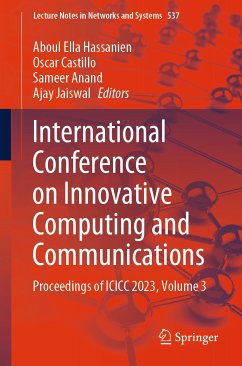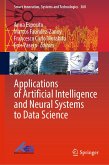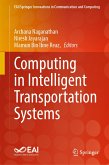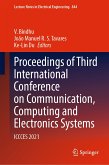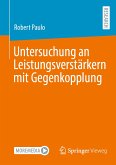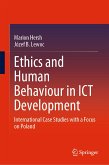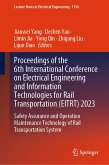International Conference on Innovative Computing and Communications (eBook, PDF)
Proceedings of ICICC 2023, Volume 3
234,33 €
inkl. MwSt.
Sofort per Download lieferbar

0 °P sammeln
International Conference on Innovative Computing and Communications (eBook, PDF)
Proceedings of ICICC 2023, Volume 3
- Format: PDF
- Merkliste
- Auf die Merkliste
- Bewerten Bewerten
- Teilen
- Produkt teilen
- Produkterinnerung
- Produkterinnerung

Bitte loggen Sie sich zunächst in Ihr Kundenkonto ein oder registrieren Sie sich bei
bücher.de, um das eBook-Abo tolino select nutzen zu können.
Hier können Sie sich einloggen
Hier können Sie sich einloggen
Sie sind bereits eingeloggt. Klicken Sie auf 2. tolino select Abo, um fortzufahren.

Bitte loggen Sie sich zunächst in Ihr Kundenkonto ein oder registrieren Sie sich bei bücher.de, um das eBook-Abo tolino select nutzen zu können.
This book includes high-quality research papers presented at the Sixth International Conference on Innovative Computing and Communication (ICICC 2023), which is held at the Shaheed Sukhdev College of Business Studies, University of Delhi, Delhi, India, on February 17–18, 2023. Introducing the innovative works of scientists, professors, research scholars, students, and industrial experts in the field of computing and communication, the book promotes the transformation of fundamental research into institutional and industrialized research and the conversion of applied exploration into real-time applications.…mehr
- Geräte: PC
- ohne Kopierschutz
- eBook Hilfe
- Größe: 24.95MB
- Upload möglich
Andere Kunden interessierten sich auch für
![Applications of Artificial Intelligence and Neural Systems to Data Science (eBook, PDF) Applications of Artificial Intelligence and Neural Systems to Data Science (eBook, PDF)]() Applications of Artificial Intelligence and Neural Systems to Data Science (eBook, PDF)181,89 €
Applications of Artificial Intelligence and Neural Systems to Data Science (eBook, PDF)181,89 €![Computing in Intelligent Transportation Systems (eBook, PDF) Computing in Intelligent Transportation Systems (eBook, PDF)]() Computing in Intelligent Transportation Systems (eBook, PDF)93,08 €
Computing in Intelligent Transportation Systems (eBook, PDF)93,08 €![Rectenna: Wireless Energy Harvesting System (eBook, PDF) Rectenna: Wireless Energy Harvesting System (eBook, PDF)]() Binod Kumar KanaujiaRectenna: Wireless Energy Harvesting System (eBook, PDF)97,95 €
Binod Kumar KanaujiaRectenna: Wireless Energy Harvesting System (eBook, PDF)97,95 €![Proceedings of Third International Conference on Communication, Computing and Electronics Systems (eBook, PDF) Proceedings of Third International Conference on Communication, Computing and Electronics Systems (eBook, PDF)]() Proceedings of Third International Conference on Communication, Computing and Electronics Systems (eBook, PDF)217,95 €
Proceedings of Third International Conference on Communication, Computing and Electronics Systems (eBook, PDF)217,95 €![Untersuchung an Leistungsverstärkern mit Gegenkopplung (eBook, PDF) Untersuchung an Leistungsverstärkern mit Gegenkopplung (eBook, PDF)]() Robert PauloUntersuchung an Leistungsverstärkern mit Gegenkopplung (eBook, PDF)62,99 €
Robert PauloUntersuchung an Leistungsverstärkern mit Gegenkopplung (eBook, PDF)62,99 €![Ethics and Human Behaviour in ICT Development (eBook, PDF) Ethics and Human Behaviour in ICT Development (eBook, PDF)]() Marion HershEthics and Human Behaviour in ICT Development (eBook, PDF)106,99 €
Marion HershEthics and Human Behaviour in ICT Development (eBook, PDF)106,99 €![Proceedings of the 6th International Conference on Electrical Engineering and Information Technologies for Rail Transportation (EITRT) 2023 (eBook, PDF) Proceedings of the 6th International Conference on Electrical Engineering and Information Technologies for Rail Transportation (EITRT) 2023 (eBook, PDF)]() Proceedings of the 6th International Conference on Electrical Engineering and Information Technologies for Rail Transportation (EITRT) 2023 (eBook, PDF)193,95 €
Proceedings of the 6th International Conference on Electrical Engineering and Information Technologies for Rail Transportation (EITRT) 2023 (eBook, PDF)193,95 €-
-
-
This book includes high-quality research papers presented at the Sixth International Conference on Innovative Computing and Communication (ICICC 2023), which is held at the Shaheed Sukhdev College of Business Studies, University of Delhi, Delhi, India, on February 17–18, 2023. Introducing the innovative works of scientists, professors, research scholars, students, and industrial experts in the field of computing and communication, the book promotes the transformation of fundamental research into institutional and industrialized research and the conversion of applied exploration into real-time applications.
Produktdetails
- Produktdetails
- Verlag: Springer Nature Singapore
- Erscheinungstermin: 31. Juli 2023
- Englisch
- ISBN-13: 9789819930104
- Artikelnr.: 68512726
- Verlag: Springer Nature Singapore
- Erscheinungstermin: 31. Juli 2023
- Englisch
- ISBN-13: 9789819930104
- Artikelnr.: 68512726
- Herstellerkennzeichnung Die Herstellerinformationen sind derzeit nicht verfügbar.
Dr. (Prof.) Aboul Ella Hassanein is Founder and Head of the Egyptian Scientific Research Group (SRGE). Hassanien has more than 1000 scientific research papers published in prestigious international journals and over 50 books covering such diverse topics as data mining, medical images, intelligent systems, social networks, and smart environment. Prof. Hassanien won several awards including the Best Researcher of the Youth Award of Astronomy and Geophysics of the National Research Institute, Academy of Scientific Research (Egypt, 1990). He was also granted a scientific excellence award in humanities from the University of Kuwait for the 2004 Award and received the superiority of scientific—University Award (Cairo University, 2013). Also he honored in Egypt as Best Researcher in Cairo University in 2013. He has also received the Islamic Educational, Scientific and Cultural Organization (ISESCO) prize on Technology (2014) and received the state award for excellence in engineering sciences 2015.
Dr. (Prof.) Oscar Castillo holds the Doctor in Science degree (Doctor Habilitatus) in Computer Science from the Polish Academy of Sciences (with the Dissertation “Soft Computing and Fractal Theory for Intelligent Manufacturing”). He is Professor of Computer Science in the Graduate Division, Tijuana Institute of Technology, Tijuana, Mexico. Currently, he is President of HAFSA (Hispanic American Fuzzy Systems Association) and Past President of IFSA (International Fuzzy Systems Association). Prof. Castillo is also Chair of the Mexican Chapter of the Computational Intelligence Society (IEEE). His research interests are in type-2 fuzzy logic, fuzzy control, neuro-fuzzy, and genetic-fuzzy hybrid approaches. He has published over 300 journal papers, 10 authored books, 40 edited books, 200 papers in conference proceedings, and more than 300 chapters in edited books, in total 865 publications according to Scopus (H index=60), and more than 1000 publications according to ResearchGate (H index=72 in Google Scholar).
Dr. Sameer Anand is currently working as Assistant Professor in the Department of Computer Science at Shaheed Sukhdev College of Business Studies, University of Delhi, Delhi. He has received his M.Sc., M.Phil., and Ph.D. (Software Reliability) from Department of Operational Research, University of Delhi. He is Recipient of “Best Teacher Award” (2012) instituted by Directorate of Higher Education, Govt. of NCT, Delhi. The research interest of Dr. Anand includes operational research, software reliability, and machine learning. He has completed an innovation project from the University of Delhi. He has worked in different capacities in International Conferences. Dr. Anand has published several papers in the reputed journals like IEEE Transactions on Reliability, International Journal of Production Research (Taylor & Francis), International Journal of Performability Engineering, etc. He is Member of Society for Reliability Engineering, Qualityand Operations Management. Dr. Sameer Anand has more than 16 years of teaching experience.
Dr. Ajay Jaiswal is currently serving as Assistant Professor in the Department of Computer Science of Shaheed Sukhdev College of Business Studies, University of Delhi, Delhi. He is Co-editor of two books/journals and Co-author of dozens of research publications in international journals and conference proceedings. His research interest includes pattern recognition, image processing, and machine learning. He has completed an interdisciplinary project titled “Financial Inclusion-Issues and Challenges: An Empirical Study” as Co-PI. This project was awarded by the University of Delhi. He obtained his masters from the University of Roorkee (now IIT Roorkee) and Ph.D. from Jawaharlal Nehru University, Delhi. He is Recipient of the Best Teacher Award from the Government of NCT of Delhi. He has more than nineteen years of teaching experience.
Dr. (Prof.) Oscar Castillo holds the Doctor in Science degree (Doctor Habilitatus) in Computer Science from the Polish Academy of Sciences (with the Dissertation “Soft Computing and Fractal Theory for Intelligent Manufacturing”). He is Professor of Computer Science in the Graduate Division, Tijuana Institute of Technology, Tijuana, Mexico. Currently, he is President of HAFSA (Hispanic American Fuzzy Systems Association) and Past President of IFSA (International Fuzzy Systems Association). Prof. Castillo is also Chair of the Mexican Chapter of the Computational Intelligence Society (IEEE). His research interests are in type-2 fuzzy logic, fuzzy control, neuro-fuzzy, and genetic-fuzzy hybrid approaches. He has published over 300 journal papers, 10 authored books, 40 edited books, 200 papers in conference proceedings, and more than 300 chapters in edited books, in total 865 publications according to Scopus (H index=60), and more than 1000 publications according to ResearchGate (H index=72 in Google Scholar).
Dr. Sameer Anand is currently working as Assistant Professor in the Department of Computer Science at Shaheed Sukhdev College of Business Studies, University of Delhi, Delhi. He has received his M.Sc., M.Phil., and Ph.D. (Software Reliability) from Department of Operational Research, University of Delhi. He is Recipient of “Best Teacher Award” (2012) instituted by Directorate of Higher Education, Govt. of NCT, Delhi. The research interest of Dr. Anand includes operational research, software reliability, and machine learning. He has completed an innovation project from the University of Delhi. He has worked in different capacities in International Conferences. Dr. Anand has published several papers in the reputed journals like IEEE Transactions on Reliability, International Journal of Production Research (Taylor & Francis), International Journal of Performability Engineering, etc. He is Member of Society for Reliability Engineering, Qualityand Operations Management. Dr. Sameer Anand has more than 16 years of teaching experience.
Dr. Ajay Jaiswal is currently serving as Assistant Professor in the Department of Computer Science of Shaheed Sukhdev College of Business Studies, University of Delhi, Delhi. He is Co-editor of two books/journals and Co-author of dozens of research publications in international journals and conference proceedings. His research interest includes pattern recognition, image processing, and machine learning. He has completed an interdisciplinary project titled “Financial Inclusion-Issues and Challenges: An Empirical Study” as Co-PI. This project was awarded by the University of Delhi. He obtained his masters from the University of Roorkee (now IIT Roorkee) and Ph.D. from Jawaharlal Nehru University, Delhi. He is Recipient of the Best Teacher Award from the Government of NCT of Delhi. He has more than nineteen years of teaching experience.
Chapter 1. Joint Identification and Clustering using Deep Learning Techniques.- Chapter 2. Comparative Analysis of deep learning with different optimization techniques for Type 2 Diabetes Mellitus detection using Gene expression Data.- Chapter 3. Differential Analysis of MOOC Models for Increasing Retention and Evaluation of the Performance of Proposed Model.- Chapter 4. Deep Convolutıonal Neural Networks Network with Transfer Learning for Image-Based Malware Analysis.- Chapter 5. Analysis of Network Failure Detection using Machine Learning in 5G Core Networks.- Chapter 6. MVR Delay:Establıshıng Self – Organızıng Vırtual Backhaul for Trusty, Relıable and Tımely Emergency Message Dıssemınatıon in VANET.- Chapter 7. Machine Learning Algorithms for Prediction of Mobile Phone Prices.- Chapter 8. Customized CNN for Traffic Sign Recognition Using Keras pre-trained models.- Chapter 9. Underwater Image Enhancement and Restoration Using Cycle GAN.- Chapter 10. Implementation of Machine LearningTechniques in Breast Cancer Detection.- Chapter 11. Performance and Analysis of Propagation Delay in the Bitcoin Network.- Chapter 12. Machine Learning Analysis on Predicting Credit Card Forgery.- Chapter 13. GanCOV: A Deep Learning & GAN based algorithm to Detect COVID-19 through Lung X-Ray Scans.- Chapter 14. Text-to-Image Synthesis using BERT Embeddings and Multi-Stage GAN.- Chapter 15. Application of Convoluted Brainwaves for Efficient Identification of Eating Disorder. etc.
Chapter 1. Joint Identification and Clustering using Deep Learning Techniques.- Chapter 2. Comparative Analysis of deep learning with different optimization techniques for Type 2 Diabetes Mellitus detection using Gene expression Data.- Chapter 3. Differential Analysis of MOOC Models for Increasing Retention and Evaluation of the Performance of Proposed Model.- Chapter 4. Deep Convolutional Neural Networks Network with Transfer Learning for Image-Based Malware Analysis.- Chapter 5. Analysis of Network Failure Detection using Machine Learning in 5G Core Networks.- Chapter 6. MVR Delay:Establishing Self - Organizing Virtual Backhaul for Trusty, Reliable and Timely Emergency Message Dissemination in VANET.- Chapter 7. Machine Learning Algorithms for Prediction of Mobile Phone Prices.- Chapter 8. Customized CNN for Traffic Sign Recognition Using Keras pre-trained models.- Chapter 9. Underwater Image Enhancement and Restoration Using Cycle GAN.- Chapter 10. Implementation of Machine LearningTechniques in Breast Cancer Detection.- Chapter 11. Performance and Analysis of Propagation Delay in the Bitcoin Network.- Chapter 12. Machine Learning Analysis on Predicting Credit Card Forgery.- Chapter 13. GanCOV: A Deep Learning & GAN based algorithm to Detect COVID-19 through Lung X-Ray Scans.- Chapter 14. Text-to-Image Synthesis using BERT Embeddings and Multi-Stage GAN.- Chapter 15. Application of Convoluted Brainwaves for Efficient Identification of Eating Disorder. etc.
Chapter 1. Joint Identification and Clustering using Deep Learning Techniques.- Chapter 2. Comparative Analysis of deep learning with different optimization techniques for Type 2 Diabetes Mellitus detection using Gene expression Data.- Chapter 3. Differential Analysis of MOOC Models for Increasing Retention and Evaluation of the Performance of Proposed Model.- Chapter 4. Deep Convolutıonal Neural Networks Network with Transfer Learning for Image-Based Malware Analysis.- Chapter 5. Analysis of Network Failure Detection using Machine Learning in 5G Core Networks.- Chapter 6. MVR Delay:Establıshıng Self – Organızıng Vırtual Backhaul for Trusty, Relıable and Tımely Emergency Message Dıssemınatıon in VANET.- Chapter 7. Machine Learning Algorithms for Prediction of Mobile Phone Prices.- Chapter 8. Customized CNN for Traffic Sign Recognition Using Keras pre-trained models.- Chapter 9. Underwater Image Enhancement and Restoration Using Cycle GAN.- Chapter 10. Implementation of Machine LearningTechniques in Breast Cancer Detection.- Chapter 11. Performance and Analysis of Propagation Delay in the Bitcoin Network.- Chapter 12. Machine Learning Analysis on Predicting Credit Card Forgery.- Chapter 13. GanCOV: A Deep Learning & GAN based algorithm to Detect COVID-19 through Lung X-Ray Scans.- Chapter 14. Text-to-Image Synthesis using BERT Embeddings and Multi-Stage GAN.- Chapter 15. Application of Convoluted Brainwaves for Efficient Identification of Eating Disorder. etc.
Chapter 1. Joint Identification and Clustering using Deep Learning Techniques.- Chapter 2. Comparative Analysis of deep learning with different optimization techniques for Type 2 Diabetes Mellitus detection using Gene expression Data.- Chapter 3. Differential Analysis of MOOC Models for Increasing Retention and Evaluation of the Performance of Proposed Model.- Chapter 4. Deep Convolutional Neural Networks Network with Transfer Learning for Image-Based Malware Analysis.- Chapter 5. Analysis of Network Failure Detection using Machine Learning in 5G Core Networks.- Chapter 6. MVR Delay:Establishing Self - Organizing Virtual Backhaul for Trusty, Reliable and Timely Emergency Message Dissemination in VANET.- Chapter 7. Machine Learning Algorithms for Prediction of Mobile Phone Prices.- Chapter 8. Customized CNN for Traffic Sign Recognition Using Keras pre-trained models.- Chapter 9. Underwater Image Enhancement and Restoration Using Cycle GAN.- Chapter 10. Implementation of Machine LearningTechniques in Breast Cancer Detection.- Chapter 11. Performance and Analysis of Propagation Delay in the Bitcoin Network.- Chapter 12. Machine Learning Analysis on Predicting Credit Card Forgery.- Chapter 13. GanCOV: A Deep Learning & GAN based algorithm to Detect COVID-19 through Lung X-Ray Scans.- Chapter 14. Text-to-Image Synthesis using BERT Embeddings and Multi-Stage GAN.- Chapter 15. Application of Convoluted Brainwaves for Efficient Identification of Eating Disorder. etc.
